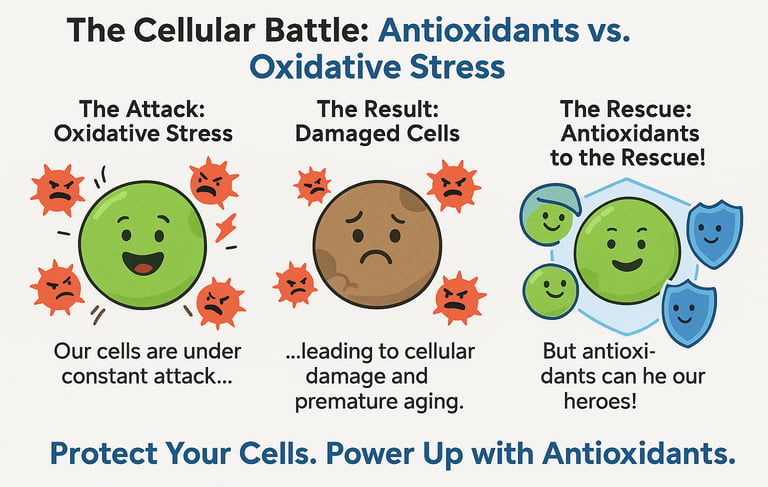The Silent Saboteur How Oxidative Stress Hijacks Your Blood Sugar Management"antioxidants, Maqui Berry"
Uncover the link between oxidative stress and blood sugar management. Learn how cellular damage impacts glucose and discover natural ways to protect your cells for better health with"antioxidants Maqui Berry"
9/2/20256 min read


Beyond the Numbers Revealing the Oxidative Stress Blood Sugar Connection
Imagine a sneaky saboteur, quietly hard at work within you, not with a flashy bang, but with a slow accelerating corrosive effect. This is not a spy thriller antagonist; it's oxidative stress, and its quiet effect upon something as fundamental as your blood sugar regulation could be an eye-opener. For too long now, blood sugar management has focused on diet, exercise, and insulin. While these are obviously essential, they overlook a core contributor to the health of your cells that dictates the efficiency with which your body is able to process sugar: the delicate balance of free radicals and antioxidants. When that balance is disrupted, your cells take a hit, and your blood sugar is out of control. Today, we will lift the veil on this vital link, exploring what oxidative stress is, how it disrupts glucose regulation at the cellular level, and most importantly, how you can build powerful defenses to protect your cells for better blood sugar management.
This Blog Short Version
Oxidative stress is a disturbance within the cell caused by the activity of damaging "free radicals" that outpace protective "antioxidants."
This cell damage specifically interferes with insulin sensitivity and the body's ability to process glucose, potentially leading to fluctuating blood sugar.
In addition to insulin, oxidative stress may block the kidneys' vital "Blood Sugar Drain" ability that eliminates naturally occurring excess glucose.
Antioxidants, especially strong ones found in fruits such as berries like Maqui Berry, are important in neutralizing free radicals and promoting healthy glucose regulation.
The Hidden Battle What is Oxidative Stress?
In the center of every cell in your body, a war is being fought in silence. On one side are "free radicals" unstable molecules with loose electrons, desperately seeking to steal electrons from other healthy molecules. In stealing, they cause harm, much in the same way rusting corrodes metal over time. On the other side are "antioxidants," your bodyguards, which freely donate electrons to stabilize free radicals, rendering them harmless. Think of antioxidants as cellular police officers, defusing threats before they can harm.
While some degree of free radical creation is beneficial a byproduct of metabolism, an effect of exercise, even a byproduct of breathing problems arise when the balance is disrupted. If free radicals get out of hand and overwhelm your antioxidant security forces, your body goes into oxidative stress mode. This cellular dysregulation can damage DNA, proteins, and lipids, ultimately derailing the proper working of your cells and tissues. It's a simple process that's the precursor to many chronic diseases, including, as we'll discover, the frustrating problem of blood sugar management.
When Cells Suffer Oxidative Stress's Effect on Blood Sugar
How in actual, tangible terms does this small cellular fight impact your blood glucose? The connection is complex and profound. Oxidative stress does not just pound cells at random, but directly targets the very mechanisms that keep your glucose in equilibrium.
Let's begin with insulin resistance. This is a condition in which your cells do not respond well to insulin, the hormone that helps to transfer glucose from your blood into your cells for energy use. Oxidative attack on cells can leave their insulin receptors damaged or less sensitive. It's like a key (insulin) is tried to be inserted into a lock (cell receptor) full of rubbish. The result? Glucose stays in the blood, leading to high blood sugar. Research always associates chronic oxidative stress with the development and progression of insulin resistance.
Second, oxidative stress attacks the pancreatic beta cells, the particular cells in your pancreas that produce insulin. These delicate cells are particularly vulnerable to free radical attack. When harmed, their ability to produce enough insulin is lost, further complicating blood sugar control. Studies indicate oxidative stress has a major role in beta cell dysfunction and death.
But the story doesn't end here. Apart from the well known activities of insulin and cell uptake, there is a less known but equally vital process in our kidneys: the "Blood Sugar Drain." This intricate mechanism, involving certain proteins like SG2, is designed to suck out excess glucose from the blood and flush it out. When oxidative stress has taken its hold, it can stall this very crucial drainage effect, as if clog blocking a pipe. If your kidneys cannot efficiently excrete excess glucose, it once again contributes to high blood glucose. New evidence suggests that kidney glucose reabsorption and the cellular state influence this process.
"When your body is bombarded by free radicals day and night, its very advanced glucose equipment begins to deteriorate. It's not what you're consuming; it's how your cells can handle what you're consuming."
Your Cellular Shield Unlocking the Power of Antioxidants
The better news is, you are not powerless against the ravages of oxidative stress. Your body has its own arsenal of antioxidants, and you can bolster these defenses by making intelligent dietary and lifestyle choices. The goal is to overwhelm your system with sufficient antioxidants to destroy free radicals before they can cause damage to your system.
Take your diet to be the first line of defense. Fruits, vegetables, nuts, and whole grains are all rich in a diverse array of antioxidants, from vitamin C and vitamin E to powerful polyphenols. Of these natural defenses, berries are the ultimate nature powerhouses.
Specifically, the Maqui Berry (Aristotelia chilensis), an indigenous plant to the Patagonian area of Chile, has been much in the news for its superior antioxidant potential. Long touted as one of the most antioxidant rich berries, its deep purple hue is a reflection of its high content of anthocyanins, specifically delphinol. Delphinol is a potent antioxidant that actively scavenges free radicals and reduces oxidative stress in the body. By doing so, it not only shields vulnerable pancreatic beta cells, enhances cellular insulin sensitivity, and above all, helps maintain your kidney's "Blood Sugar Drain" healthy and functional. It's all about enhancing your body's natural capability to regulate glucose levels.
Your Action Plan Strengthening Your Defenses
Taking active steps to reduce oxidative stress and boost your antioxidant defenses can play a big role in your overall health as well as your blood sugar management. Here's where you can start today:
Eat the Rainbow: Emphasize eating a diet high in colorful fruits and vegetables. Each color is generally associated with different antioxidant compounds. Aim for 7-9 servings daily.
Prioritize Berries: Make berries a regular part of your diet. Beyond Maqui, blueberries, raspberries, and blackberries contain protective anthocyanins.
Lower Stress: Chronic psychological stress can raise oxidative stress. Incorporate stress-reducing activities like meditation, yoga, deep breathing, or exposure to nature.
Routine Physical Activity: Regular, moderate exercise makes your body produce its own antioxidants, establishing a healthier balance. Avoid overtraining, which increases oxidative stress for a short time.
Limit Processed Foods & Sugars: These have a proclivity to cause inflammation and create free radicals, which put more onus on your antioxidant system.
Our Top Evaluation for Cellular Protection
Staying current with the intricate dance between oxidative stress and blood sugar control can be overwhelming, but being educated with the right information does make all the difference. For those in need of targeted support to enhance the body's natural defense and promote healthy glucose regulation, we've found an ideal solution. Introducing GlucoBerry, a doctor formulated supplement backed by Ivy League research. It's uniquely formulated with a patented blend of premier grade Maqui Berry extract, chosen for its promise to augment the kidney's critical "Blood Sugar Drain" by triggering SG2 protein synthesis. By helping to open up blockages in this vital system and providing potent antioxidants, GlucoBerry offers a comprehensive solution to protecting your cells and ensuring normal blood sugar levels. We strongly recommend that you read about GlucoBerry and find out how it can help you on the path to optimal cellular health and enhanced glucose control.
Questions May Arise In Yours Mind
How i understand easily i am under attack of oxidative stress are: While not always a dramatic thing, you may come across of brain fog, chronic fatigue, sickness, premature aging (wrinkled complexion, hair loss), and muscle soreness can be signs. Blood tests can also measure markers of oxidative damage.
If my lifestyle help me oxidative stress by itself : Off course yes extreme and consistent lifestyle changes like a good diet, exercise, sufficient sleep, and adequate stress management can meaningfully reduce and even reverse oxidative stress in the long term. But in some diseases, directed nutritional supplementation may have added benefits.
How much time to control of blood sugar by reducing oxidative stress: Repair of cells and metabolic shifts take time,being after a few weeks,consistent efforts usually notice with pronounced and measurable impacts on blood sugar levels.
Conclusion A Wholistic Perspective on Health
The story of blood sugar control is changing. It's not longer simply a matter of counting carbs and tracking insulin; it's a matter of comprehending the significant role of cellular well being. Oxidative stress is the missing key, a crucial piece of the puzzle that is too often misunderstood. By becoming aware of its role in derailing glucose regulation and taking action to bolster your body's antioxidant defenses, you're making a strong move toward a more comprehensive and effective plan for your health. Taking the initiative with oxidative stress isn't just about playing numbers, it's about nurturing the very cornerstone of your cellular energy, inviting a brighter, richer tomorrow.




Health and Wellness
Your trusted source for health and fitness.
Connect
contact: beahealth.it@gmail.com
© 2025. All rights reserved.
